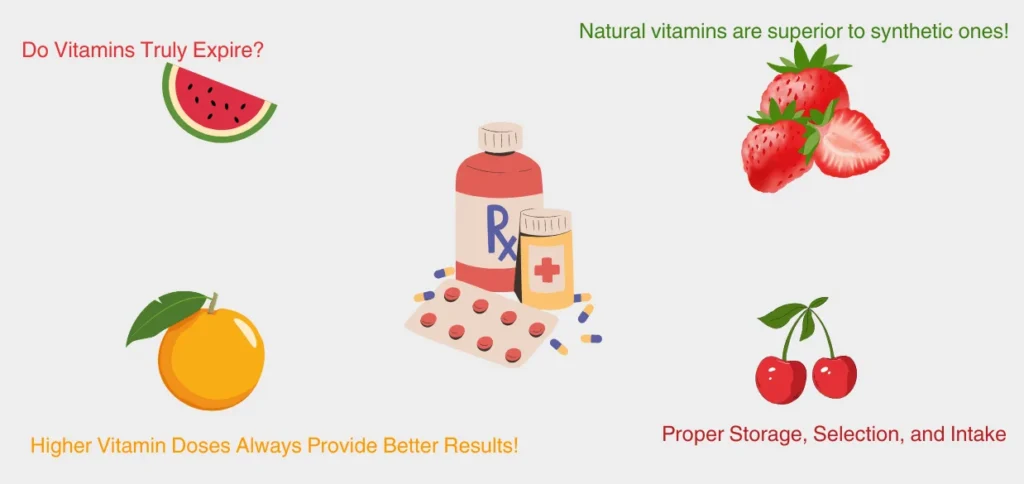Explore the World of Vitamins: Myths About Expiration Dispelled!
When was the last time you raided your medical cupboard and found a dusty vitamin bottle that was over its expiration date? Fear sets in: are they now worthless, even dangerous? Do not be alarmed, health fanatic! Here is where the intriguing world of vitamins becomes fact from fiction.
They are vital micronutrients that are crucial to maintaining the proper functioning of our bodies. They function as microscopic conductors, coordinating everything from maintaining strong bones and vibrant skin to supporting a robust immune system. However, since the expiration date is printed on every vitamin bottle, there is a nagging doubt as to whether these nutrients truly lose their magical qualities after that point.

Hang on to your hats—we’re about to set out on a quest to sort the truth from fantasy when it comes to vitamin expiry. We’ll explore the science underlying those dates, unearth startling revelations regarding vitamin potency, and arm you with the information you need to make wise decisions regarding your personal health. So grab a seat, and get ready to debunk some widespread vitamin fallacies!
Diving Into Myth and Verifying Reality: Do Vitamins Really Go Bad?
Expire dates can be confusing, especially when it comes to our valuable supplements, let’s face it. After that date, do they suddenly become miniature time bombs ready to devastate our health? Calm down, for the reality is much more subtle and very liberating. Let’s dispel a few urban legends and clarify the truth regarding vitamin expiration:
Myth #1: Expiration Date = Useless Vitamins
Well that is not correct. The expiration date on your vitamin bottle isn’t actually a death sentence. It’s more like a “best by” date, similar to the one on your favorite yogurt. It signifies the point when the manufacturer can guarantee the vitamins full potency, not that it instantly turns into dust (unusable thing) after that date. Think of it as a quality assurance checkpoint, not a vanishing act.
Fact: Many Vitamins Are Shelf-Stable Champions
Here’s the good news: numerous vitamins are known for their resilience, retaining significant potency well beyond their expiration date. Studies indicate that:
- B vitamins: B12, B1, B2, B3, B6, If stored properly, these resilient souls can hold up to 70% of their potency for up to five years after their expiration date.
- Vitamin C: In optimal storage settings, this antioxidant warrior can retain over 70% of its potency for up to two years after it is supposed to expire.
- Vitamin E: When stored properly, this fat-soluble vitamin can last up to three years after it is supposed to expire.
But it’s crucial to remember that these are merely illustrations. Depending on its form (tablets, liquids), components, and storage circumstances, each vitamin’s stability can change.
Myth #2: Vitamins that expire pose a health risk
Don’t worry, vitamins that are past their peak are not likely to be harmful. This is the reason why:
Diminished Strength, Not Harm: Rather than the vitamins becoming hazardous, the main worry with expired vitamins is that they might have lost part of their efficacy. They could just not pack the same nutritional punch as they used to.
There Are Exceptions: Liquid vitamins and those containing iron are an exception, while being typically safe. Vitamins in liquid form decay more quickly, and iron, even in expired form, may upset your stomach if you take too much of it.
Remember: It’s always advisable to speak with a healthcare provider if you have any questions concerning a particular vitamin or substance.
Myth Busters: Shattering Common Vitamin Misconceptions
We’ve sorted fact from fiction regarding expiration dates, but the world of vitamins holds more myths just waiting to be debunked! Let’s proof some popular misconceptions wrong and equip ourselves with accurate information:
Myth #1: Natural vitamins are superior to synthetic ones.

This is untrue! Because they have the same chemical component, vitamins—both natural and synthetic—perform the same functions in our bodies. The vitamin itself is the same, even though natural sources frequently include additional advantageous nutrients in addition to this one. Your body thus gets the same amount of vitamin C whether you choose to take a pill or eat a juicy orange.
Myth #2: Higher Vitamin Doses Always Provide Better Results
No, not in every case! Certain vitamins, such as the water-soluble vitamins A, D, E, and K, can build up in the body when taken in excess. Toxicology and unpleasant side effects may result from this. Always take the medication as directed by the label, or get tailored advice from your doctor.
Myth #3: You Can Get All the Vitamins You Need from Supplements
Let’s face it, popping a pill seems easier than eating your veggies, right? But the truth is You should eat a balanced diet rich in fruits, vegetables, whole grains, and lean protein to meet your nutritional needs. The supplements just cannot match the symphony of nutrients found in these foods, which function together for optimal health.
Myth Busting:
Myth: Vitamin C can help avoid the common cold. While vitamin C can support your immune system, research hasn’t shown it definitively prevents colds.”.
Sources:
- National Institutes of Health: https://www.nih.gov/
- Office of Dietary Supplements: https://ods.od.nih.gov/
- World Health Organization: https://www.who.int/
Remember, this information is for educational purposes only and shouldn’t substitute professional medical advice. Always consult your doctor before starting new supplements or changing your diet significantly.
Stay tuned! In the following section, we’ll explore alternative approaches for nutrient intake and maximize vitamin effectiveness. Let’s explore the fascinating world of vitamins!
Unlock Your Vitamin Power with Proper Storage, Selection, and Intake
After dispelling widespread rumors, let’s explore how to maximize the benefits of your vitamins! You can optimize their efficacy by taking into account the subsequent elements:
- Treat your Micronutrients like tiny treasures!:Handle your Micronutrients as if they were little gems! It is essential to store them properly to preserve their efficacy. How to be a storage superhero is as follows:
- It’s Best to Stay Moderate and Dry: A cabinet or other dark, cool (room temperature), and dry location away from heat sources and sunlight is what you want. Heat and moisture are the enemy of vitamins, therefore avoid them.
- Always strongly sealed: After every usage, tightly seal the bottle once you’ve opened it. This stops air and moisture from seeping in and degrading your vitamin intake.
Selecting Champions:
Choosing the correct vitamins might be overwhelming due to the abundance of options available. Here are some pointers for making informed decisions:
- Considering the Forms: Think about the form that works best for you. Liquids may be simpler for certain people to absorb, while tablets are more practical and powders provide versatility. Select according to your preferences and requirements for absorption.
- Brand Reputation: Choose trustworthy brands that have a track record of excellence and openness. Seek for brands whose purity and efficacy have been independently verified.
- Getting he Professional Advice: When in doubt, get advice from a medical expert. They can assist you in selecting vitamins based on your particular requirements and any possible drug interactions.
Monitor Your Intake: Be a Dosage Detective!
Remember, even good things can come in harmful excess. Here’s how to be a savvy dosage detective:
- Interaction Investigation: Be aware of potential interactions between your vitamins and any medications or other supplements you’re taking. Check with your doctor or pharmacist to avoid unwanted side effects.
- Recommended Route: Stick to the recommended dosage listed on the label or advised by your healthcare professional. Taking too much can be counterproductive and even harmful in some cases.
By following these simple steps, you can empower your vitamins to work their magic and contribute to your overall well-being. Remember, a balanced diet rich in fruits, vegetables, and whole grains should be your primary source of nutrients, with supplements playing a complementary role.
Stay tuned for the final chapter! We’ll explore alternative approaches to nutrient intake, so you can create a well-rounded strategy for optimal health.
Quick Reference Chart: Vitamin Shelf Life & Storage Tips
| Vitamin | Typical Shelf Life (After Expiration) | Storage Recommendations |
| Vitamin A | 1-2 years | Cool, dry, dark place |
| Vitamin B1 (Thiamine) | 2-3 years | Cool, dry, dark place |
| Vitamin B2 (Riboflavin) | 3-5 years | Cool, dry, dark place |
| Vitamin B3 (Niacin) | 4-5 years | Cool, dry, dark place |
| Vitamin B6 (Pyridoxine) | 2-3 years | Cool, dry, dark place |
| Vitamin B12 (Cobalamin) | 5+ years | Cool, dry, dark place |
| Vitamin C (Ascorbic Acid) | 1-2 years | Cool, dry, dark place |
| Vitamin D | 2-3 years | Cool, dry, dark place |
| Vitamin E | 2-3 years | Cool, dry, dark place |
| Vitamin K | 2-3 years | Cool, dry, dark place |
Please note: This chart provides general guidelines. The actual shelf life and storage requirements of specific vitamins may vary depending on the brand, form (tablets, powders, liquids), and other factors. Always consult the product label for specific information.
Additional Tips:
- Store liquid vitamins in the refrigerator after opening.
- Consider airtight containers if transferring vitamins from their original packaging.
- Replace vitamins after they reach their recommended shelf life, even if they appear unchanged.
Remember, proper storage and informed choices can help you maximize the effectiveness of your vitamins and contribute to your overall well-being.
Beyond the Bottle: Embracing a Nutrient-Rich Journey
We’ve explored the fascinating world of vitamins, debunked myths, and unlocked tips for maximizing their effectiveness. But remember, supplements play a complementary role in your overall health journey. The foundation lies in a vibrant balanced diet brimming with whole foods!
Whole Foods: Nature’s Nutrient Powerhouse
Think of fruits, vegetables, whole grains, and lean protein as nutritional powerhouses. They offer a symphony of vitamins, minerals, fiber, and other essential compounds that work synergistically to nourish your body and mind. Unlike isolated vitamins in supplements, whole foods come packaged with a wealth of additional nutrients that enhance their absorption and utilization.
Tips for a Nutrient-Rich Plate:
- Embrace the Rainbow: Fill your plate with a variety of colorful fruits and vegetables, each offering unique vitamins and antioxidants. Aim for at least 5 servings daily.
- Go Whole Grains: Opt for whole-wheat bread, brown rice, quinoa, and oats over refined grains for sustained energy and fiber.
- Choose Lean Protein: Include lean protein sources like fish, poultry, beans, and lentils to support muscle building and repair.
- Don’t Forget Healthy Fats: Include healthy fats from sources like avocados, nuts, seeds, and olive oil for optimal nutrient absorption and satiety.
- Cook Smart: Steaming, grilling, and baking help preserve nutrients compared to frying or deep-frying.
Remember: This is just the beginning! Explore new recipes, experiment with different cuisines, and find joy in creating delicious and nutritious meals.
Conclusion: Expiration Dates Don’t Define You
So, what about those expiration dates? Remember, they don’t spell the end of your vitamins’ usefulness. By understanding proper storage, making informed choices, and consulting your healthcare professional, you can maximize their potential. But don’t forget the true nutritional superheroes: whole foods! Embrace a balanced diet rich in color and variety, and you’ll be well on your way to a vibrant and healthy life.
Ready to take action?
- Consult your doctor or a registered dietitian for personalized guidance.
- Share this post with your friends and family to spread the knowledge!
- Explore exciting new recipes and discover the joy of nourishing your body with whole foods.
Remember, your health journey is unique and ongoing. Embrace the power of knowledge, informed choices, and a balanced diet for a life brimming with well-being!
Want to read more Blogs: click here


